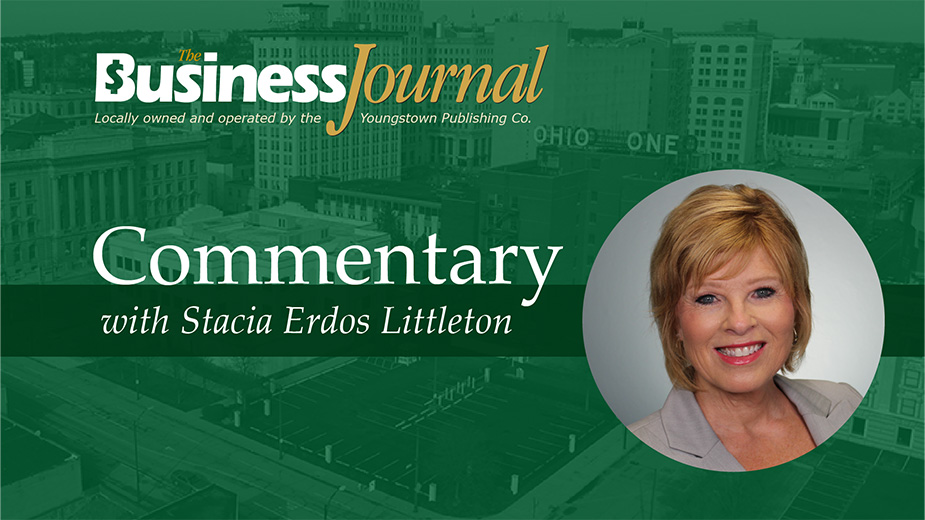By Stacia Erdos Littleton
YOUNGSTOWN, Ohio – As this edition was going to print, voters in Ohio’s 6th congressional district were heading to the polls to vote in a special election on who would fill the unexpired term of Bill Johnson – now president of Youngstown State University.
It’s not going out on a limb much to assume turnout was low. Special elections don’t draw much of a crowd other than hardcore supporters of one side or the other.
It’s also become apparent that except for the hardcore supporters of both 2024 presidential candidates, many voters are turned off and have simply tuned out. (Not to mention that the upcoming race feels more like an election between two incumbents.) They say they’re “over it” and want to avoid the vitriol that accompanies political debate – even among family members. Others are apathetic because they don’t like either candidate.
As a news and political junkie, I admit I find it hard to understand. But when I hear that sentiment coming from women, I’m especially taken aback. In fact, recently two young women (in their late 20s and early 30s) told me, “I’m not into politics.” That made me want to shake them and yell, “What? You have to be – you’ve GOT to pay attention!”
I wonder if they understand that it took 143 years for women to have the right to vote in the United States of America; that our mothers were denied credit cards in their own names until 1974, and so couldn’t build credit or buying power; that it took until Roe v. Wade in 1973 for women to have a say over their own bodies, and that hard- fought right was recently taken away in a blink of an eye?
Our daughters have less reproductive freedom than their grandmothers. And now, there is an underlying push to take the option of birth control off the table as well.
We cannot take for granted what our foremothers fought for and how far we’ve come. Last year, the number of women running Fortune 500s hit 10% – a measly milestone. Having said that, in 1995, there were zero. And while 70 countries have had a female leader, the United States still has not seen a female president (nor have we had a female mayor in Youngstown for that matter.)
We must keep our eyes wide open. We don’t have the luxury to tune out what’s happening in Washington, in the state legislature, or even at our local school boards because we are turned off by today’s political climate.
According to PEN America, there were 4,000 instances of book bannings across the nation in the first half of the 2023-24 school year, with more than 10,000 bans over the past 21/2 years. Florida has the highest number banned – 3,135 books across 11 school districts.
Some of those bans or attempted bans have included some of my favorite books growing up: “A Wrinkle in Time,” and thought-provoking classics such as “1984” and “To Kill a Mockingbird.” The American Library Association reports Ohio is among 17 states with challenges to 100 or more titles.
State Rep. Al Cutrona of Canfield recently introduced legislation to prohibit public libraries from allowing those under 18 to borrow or view materials deemed harmful to juveniles without parental consent. (He failed to define what that might be.)
I’ve read that under the legislation, anyone can file a complaint over materials with the state library board, which would then investigate. Libraries found in violation would have state funding withheld. The Ohio Library Council says this type of legislation can “have a significant chilling effect on many of our public libraries and our patrons’ rights to have access to information.”
One young woman who’s keeping her eyes wide open is Idaho high school graduate Annabelle Jenkins. At graduation, after she shook hands with administrators on the stage, Jenkins paused in front of the West Ada School District superintendent and pulled out “The Handmaid’s Tale” from the sleeve of her graduation gown. The superintendent stood firm with his arms crossed and declined the book, leaving Jenkins to drop it at his feet.
The novel, written by Margaret Atwood, was one of 10 the school district banned from its libraries, deemed unsuitable for the student body.
Annabelle had written an inscription on the inside cover saying she hoped the superintendent would enjoy it. She added this quote from New York Times’ best-selling author Ellen Hopkins: “Torch every book, burn every page, char every word to ash. Ideas are incombustible and therein lies your real fear.”
While it may be less stressful to tune out politics, we have to keep our eyes wide open. Our daughters and granddaughters’ futures depend on it.
